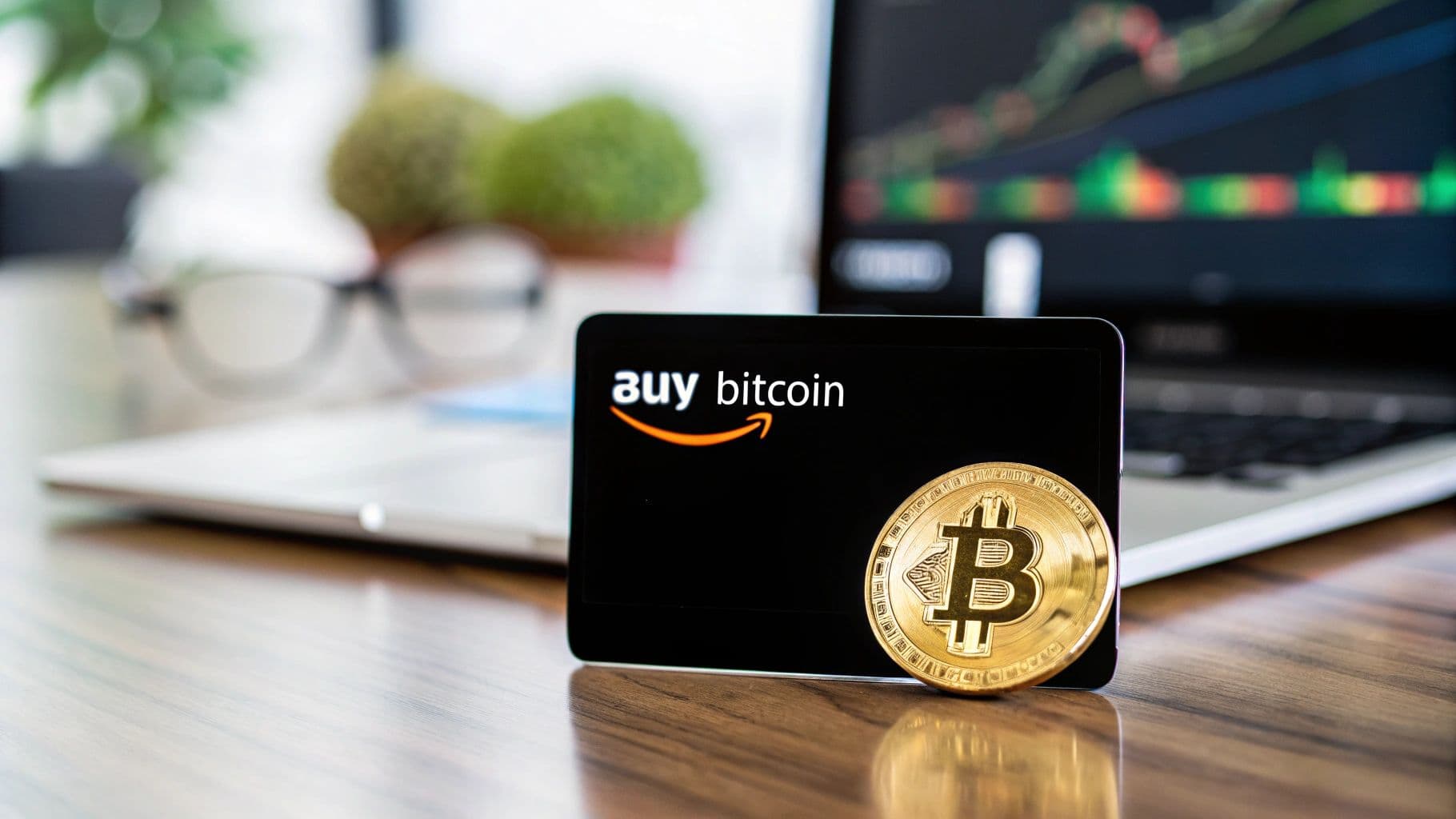
Buying Bitcoin With Amazon Gift Card – Quick & Easy
Got an Amazon gift card gathering dust? You might be surprised to learn you can swap it for Bitcoin. It's not as straightforward as using a credit card on a major exchange like Coinbase, but it's absolutely doable.
The trick is to use a Peer-to-Peer (P2P) marketplace. These platforms connect you directly with other people, not a company. You're not "buying" Bitcoin from the platform; you're selling your gift card code to someone else, and they pay you in crypto.
Why Bother With a Gift Card, Anyway?
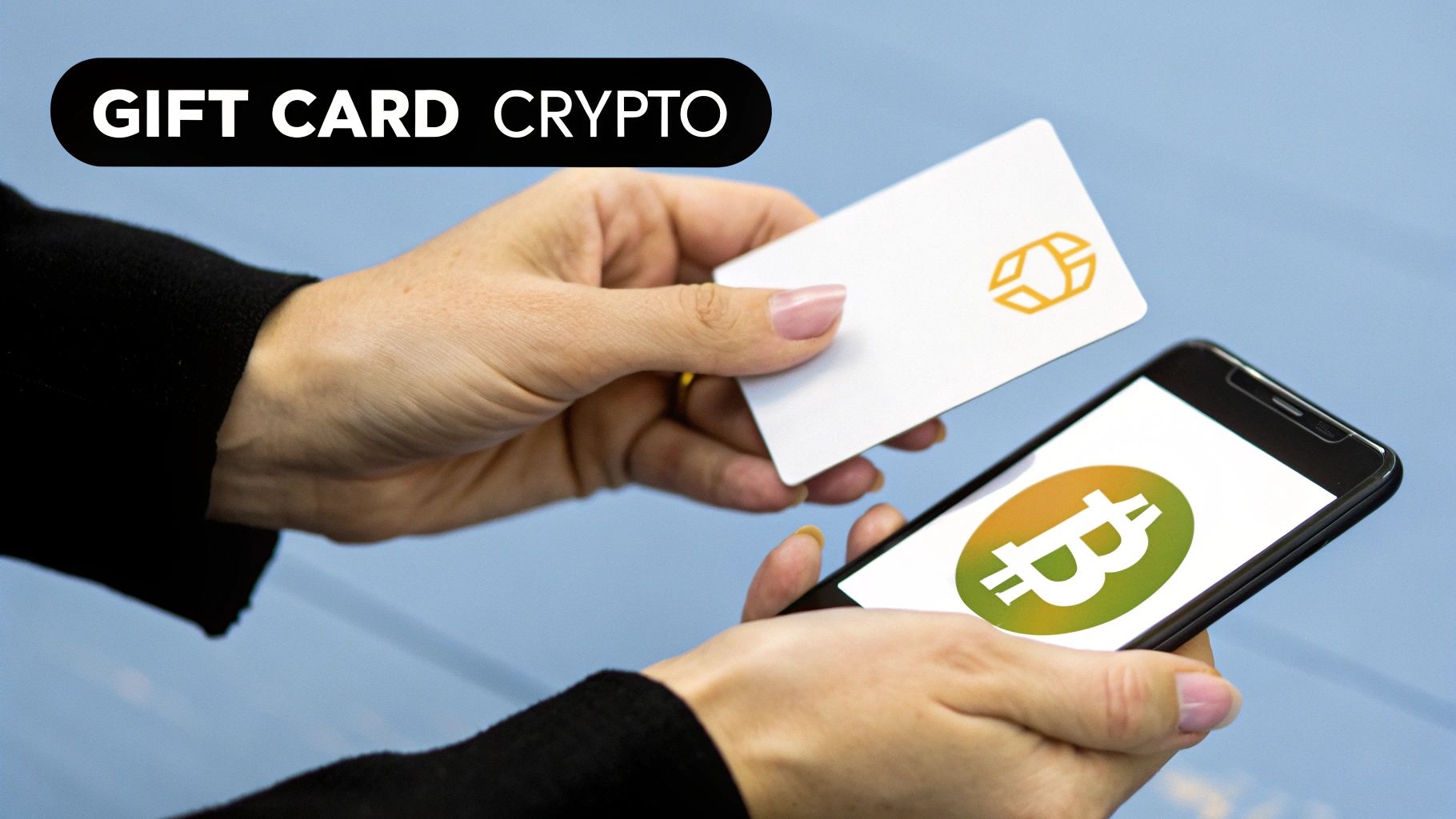
It might seem like a roundabout way to get into crypto, but there are solid reasons why people go this route. It often comes down to privacy, accessibility, or just making use of what you have on hand.
Keeping Things Private and Accessible
Let's face it, major crypto exchanges want a lot of your personal information. P2P platforms, on the other hand, often have more relaxed identity verification rules, which means you can trade with a greater degree of anonymity.
This method also opens up the world of crypto to people without traditional bank accounts. If you can buy a gift card with cash, you can get Bitcoin. It’s a bridge into the digital asset world that sidesteps the banking system entirely.
Putting Unused Funds to Work
How many of us have a random gift card from a birthday or holiday sitting in a drawer? Turning that dormant store credit into an asset like Bitcoin can feel like a smart move—transforming "found money" into a real investment.
And there are a lot of these cards floating around. The global gift card market is massive, projected to hit $1.24 trillion by 2025 and an eye-watering $3.81 trillion by 2034. In North America alone, the market was valued at over $397 billion in 2024. With that much value in circulation, it's no wonder people have found creative ways to use them. For more on these numbers, check out this detailed gift card market analysis.
The core idea is simple: You have an Amazon gift card code someone else wants, and they have the Bitcoin you're looking for. P2P platforms just provide a safe space for that trade to happen.
The secret sauce that makes this all work is an escrow system. When you start a trade, the platform automatically locks the seller's Bitcoin. You send them your gift card code, they verify it, and once they confirm the funds are good, the platform releases the Bitcoin to your wallet. This is the crucial safety net that prevents them from taking your code and vanishing.
Alright, let's get that Amazon gift card turned into Bitcoin. The first and most critical move you'll make is picking the right peer-to-peer (P2P) marketplace. This isn't just about finding a buyer; it's about finding a safe place to trade. Think of it as your primary shield against scams.
The absolute, non-negotiable feature you're looking for is a rock-solid escrow system. This is your safety net. The platform acts as a neutral third party, holding the seller's Bitcoin in limbo. Only when you've confirmed the gift card works and the trade is complete does the platform release the crypto to you. Trading without escrow is like handing your cash to a stranger and hoping for the best.
Checking Out a Seller's Track Record
Beyond the platform's mechanics, you need to become a bit of a detective. A reputable marketplace will give you all the tools you need to vet potential trading partners. You should be able to easily see a seller's entire trading history, their positive and negative feedback ratings, and how long they've been on the platform.
Treat it like you're hiring someone. A seller with thousands of completed trades and a 99% positive feedback score is obviously a much safer bet than a brand-new account with only a few transactions under its belt. Platforms like Paxful and Noones really lean into this, making user reputation a cornerstone of their communities.
Key Takeaway: Always check the platform's dispute resolution process before you start a trade. How do they handle it when things go wrong? If their process is buried in fine print or seems vague, that's a huge red flag. It tells you they might not have your back if a deal sours.
This method of trading has become incredibly popular for good reasons—it's convenient, offers a degree of privacy, and can be more cost-effective than you'd think.
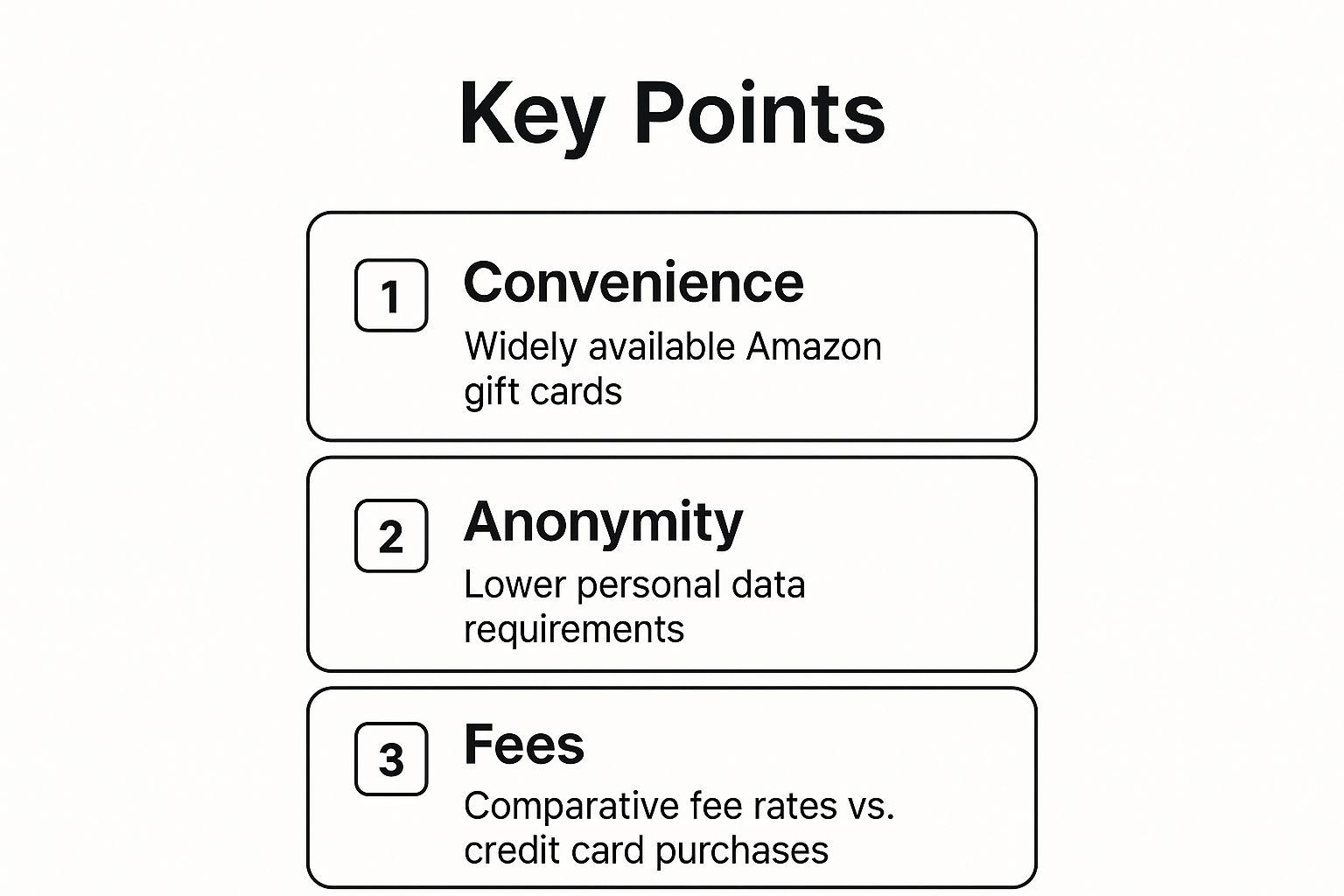
As you can see, using a common gift card opens up a new avenue for acquiring Bitcoin that sidesteps some of the hurdles of traditional exchanges.
Comparing Top P2P Platforms for Amazon Gift Card Trades
Choosing the right P2P marketplace comes down to comparing their core safety and usability features. While many platforms exist, a few have historically dominated this space. Here’s a look at how they stack up.
| Platform Feature | Paxful | Noones (formerly Paxful) | LocalBitcoins (Historical Context) |
|---|---|---|---|
| Escrow Service | Yes, mandatory for all trades | Yes, a core security feature | Yes, was a key feature |
| User Reputation System | Detailed profiles with feedback, trade history, and verification levels. | Very similar to Paxful, with comprehensive user profiles and feedback. | Provided user history and feedback scores, but was less detailed. |
| Dispute Resolution | Moderated dispute process with a dedicated support team. | Offers a moderated system for resolving trade disagreements. | Had a dispute system, but it was often criticized for being slow. |
| Gift Card Trades | Yes, a primary focus with a wide variety of gift cards accepted. | Yes, continues to be a central part of their P2P offerings. | Removed this feature in 2019 due to fraud risks. |
This comparison shows that platforms like Paxful and Noones have built their infrastructure specifically to handle trades like these, with mandatory escrow and transparent reputation systems being central to their user experience. LocalBitcoins, once a giant, moved away from this model, highlighting the unique risks and requirements of gift card trading.
Red Flags to Watch For
When you're zeroing in on a platform, do some homework outside of their website. Jump on Reddit or Trustpilot and search for user reviews. Are you seeing a pattern of complaints? Constant mentions of frozen accounts, unresolved disputes, or non-existent customer support are serious warnings.
Here’s a final checklist of must-have features for any P2P marketplace you consider:
- Mandatory Escrow: This is non-negotiable. It ensures the seller’s Bitcoin is locked and secure until you give the green light.
- Detailed User Profiles: You need to see trade volume, feedback scores, and how long the user has been active.
- A Clear Path for Disputes: The platform must have a well-defined and accessible mediation process.
- Responsive Support: You need to know you can reach a real human if you hit a snag.
Ultimately, it’s about your comfort level. No platform is 100% risk-free, but picking one with these user-first security features stacks the odds firmly in your favor. This same logic applies to businesses, too; secure and reliable systems are crucial. For any entrepreneurs reading, it's worth learning more about how to accept crypto payments for your business to see how these principles scale. A little due diligence now makes for a much smoother, safer trade later.
Making Your First Gift Card to Bitcoin Trade
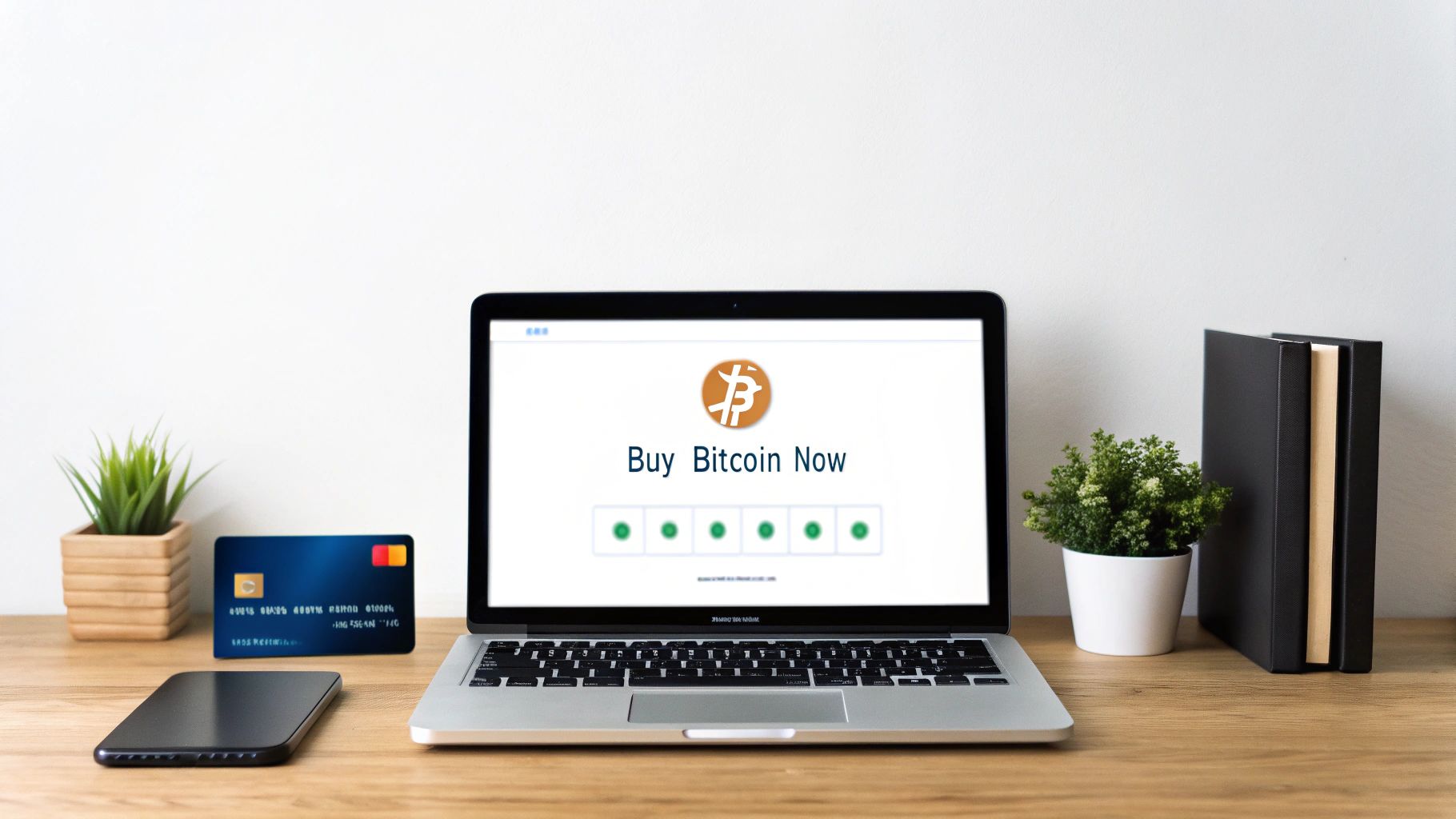
Alright, you've picked a platform and you're ready to go. Let's walk through how this actually works. Imagine you're holding a $50 Amazon gift card and want to turn it into Bitcoin. The very first thing you'll do on any P2P marketplace is get your account set up and verified. This usually just means filling out your profile and, most importantly, enabling two-factor authentication (2FA). Don't skip the 2FA—it’s your first line of defense.
With your account secured, head over to the marketplace section. This is where you'll find people looking to trade. You need to filter the offers to find exactly what you're looking for. Set your search to "Buy Bitcoin" and choose "Amazon Gift Card" as the payment method. You can usually filter by currency and location, too, which helps cut through the noise.
Finding and Vetting the Right Seller
You'll now be looking at a list of offers, and you'll immediately notice the exchange rates vary quite a bit. One person might offer $0.85 in Bitcoin for every $1 on your card, while another is only offering $0.78. Naturally, you want the higher rate, but that's not the whole story. The most critical part of this process is checking out the seller.
Take a few minutes to click on a few profiles. Here’s what I always look for:
- Positive Feedback: A score of 98% or higher is what you want to see. Anything less is a red flag.
- Trade Volume: Someone with thousands of completed trades is a pro. A seller with only a handful? They might be fine, but they're less of a sure thing.
- Account Age: An account that's been active for years is a good sign. New accounts can be risky.
- Release Times: Most platforms show how fast the seller typically releases the Bitcoin. Faster is always better.
Honestly, a trusted seller with a slightly lower rate is a much smarter bet than a brand-new account offering a rate that seems too good to be true. A little due diligence here will save you a world of headaches later.
Reading the Seller's Terms (Don't Skip This!)
Before you even think about starting a trade, you have to read the seller's terms. These are their specific rules for the transaction. It might seem tedious, but ignoring them is the quickest way to get a trade canceled or end up in a dispute.
Pro Tip: Pay close attention to the details. A seller might require a photo of the physical gift card with the trade ID written on a piece of paper next to it. Some even ask for the store receipt to prove the card was bought legitimately.
You’ll see a few common requirements pop up again and again:
- Physical vs. E-code: Some sellers won't touch e-codes; they only want physical cards.
- Receipts Required: This is a big one. Many traders demand the original receipt to protect themselves from fraud.
- Denomination Limits: A seller might only trade for specific card amounts, like $50 or $100 cards.
- No Brokering: This just means you have to be the original owner of the gift card.
If you have a $50 e-code with no receipt, you need to find a seller whose terms match what you're offering. Don't try to trade with someone who requires a physical card and receipt—it’s just a waste of everyone’s time.
Starting the Trade and Staying Safe
Found a seller whose rules you can follow? Great. It's time to open the trade.
Enter the amount of your gift card—in this case, $50. The magic of the platform is what happens next: the equivalent amount of the seller's Bitcoin gets locked into a secure escrow. You'll get a clear notification that this has happened. This is your safety net. The seller's crypto is now held by a neutral third party.
A chat window will open up. I always start with a quick "Hi" to make sure the seller is online and ready. They’ll then give you instructions, which should be the same as the terms you already read. They will tell you exactly when and how to send your gift card information.
Do not, under any circumstances, send your gift card code until you see that the Bitcoin is in escrow. The platform's interface makes this very obvious.
Once the seller gives you the green light, upload your code or photos right there in the trade chat. As soon as you've sent it, hit the "I have paid" button. This officially marks the ball as being in their court.
The seller will then take a few minutes to check your code and redeem it. The second they confirm the funds are good, they'll release the Bitcoin from escrow, and it will appear in your platform wallet instantly.
And that's it! The last thing to do is leave feedback. If the trade went smoothly, leave a positive review. It helps good sellers stand out and keeps the whole community safer.
How to Avoid Common Scams and Stay Secure
Peer-to-peer (P2P) trading is a fantastic way to buy Bitcoin with an Amazon gift card, but let's be honest—it’s also a bit of a wild west. This freedom means you have to be extra sharp. Think of yourself as the sheriff of your own trade; staying vigilant is the best way to keep scammers at bay.
One of the oldest tricks in the book is a buyer trying to rush you. They’ll create a sense of urgency, pressuring you to send over the gift card code before the platform confirms their Bitcoin is locked in escrow. Don't fall for it. That escrow lock is your only safety net.
Spotting a Scammer's Playbook
Another classic scam is the "already redeemed" trick. Here’s how it works: a scammer gets your perfectly valid gift card code, redeems it instantly, and then turns around to claim it was invalid when you sent it. They'll quickly open a dispute, banking on the idea that you can't prove them wrong.
This is why you have to document everything. I mean everything.
Before you even think about starting a trade, get proof. Take a clear screenshot of your Amazon gift card balance. Better yet, do a quick screen recording. Once the trade begins, screenshot every single step: the chat, the platform's confirmation that the Bitcoin is in escrow, and the exact moment you paste the code. This paper trail is your best weapon if things go south.
Be extremely cautious of deals that look too good to be true. If someone is offering 95% or more of your gift card's value in Bitcoin, it's a massive red flag. Real traders have to cover their risk and make a small profit, so expect a more realistic rate.
A Security Checklist That Actually Works
Protecting your crypto isn't complicated. It really comes down to a few core habits. Stick to these, and you’ll avoid the vast majority of scams out there.
- Never Leave the Platform: Scammers love to move the conversation to Telegram, WhatsApp, or email. Why? Because it gets you away from the platform's security and, most importantly, its escrow system. If someone suggests this, end the trade immediately.
- Do Your Homework on the Seller: Don't just look at their feedback score. Dig deeper. A trustworthy trader will have a long history of successful trades and plenty of recent positive comments. A brand-new account with a perfect score is far riskier than an established one.
- Wait for the Escrow Confirmation: This is the golden rule. Never send your gift card details until you see that official "Bitcoin is secured in escrow" notification from the platform. No exceptions.
- Use a Fresh Bitcoin Address: Once the trade is complete and the Bitcoin is yours, move it out of the platform's wallet and into a personal wallet you control. This protects you if the exchange itself ever has a problem. To do this safely, you need to understand the fundamentals of crypto addresses, which you can learn about in our guide on what a Bitcoin address is.
The demand for turning gift cards into crypto has exploded, creating a whole ecosystem of these P2P platforms. Amazon gift cards are consistently one of the most popular assets being traded. But remember, more popularity means more potential targets for scammers, which makes your own diligence more critical than ever.
Understanding the Real Cost of Your Trade
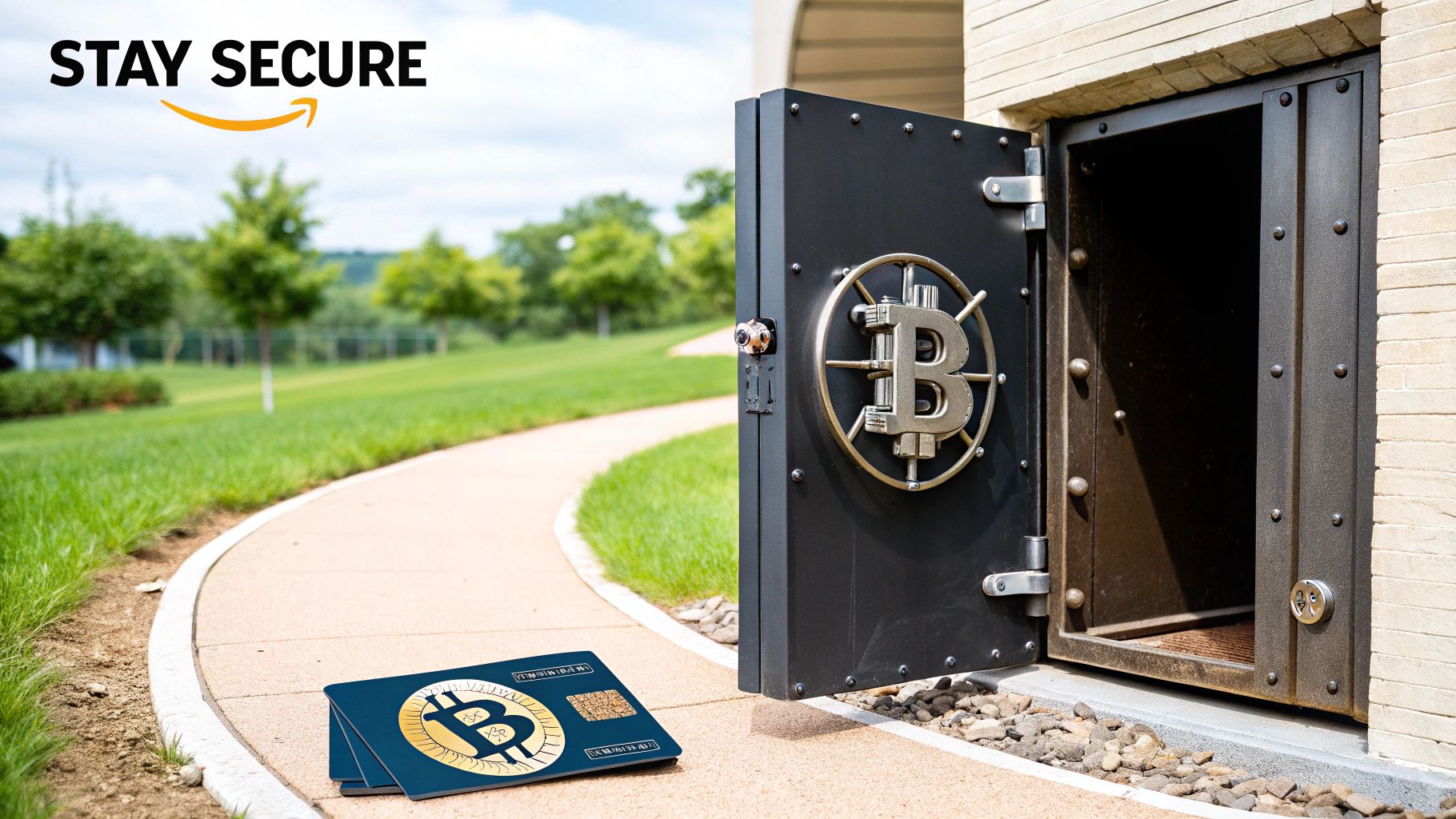
Let's get one thing straight right away: when you're buying Bitcoin with an Amazon gift card, you won't get a perfect dollar-for-dollar exchange. Your $100 gift card isn't going to land you exactly $100 worth of Bitcoin. Knowing this upfront is crucial, so you don't feel short-changed later.
The difference boils down to the "rate" or "premium" the seller charges. Think of it as their service fee. They’re taking on the risk and the hassle of turning your gift card into actual cash, and that premium is how they get paid for their time and effort.
Why You're Paying a Premium
The rate you're offered isn't just a random number; it's based on a few key factors that create a dynamic marketplace. A seller has to deal with the possibility of fraudulent cards and the time it takes to actually use or sell the gift card balance. That's why the rates can sometimes look a bit steep.
Here’s a breakdown of what influences the offer you'll get:
- Market Demand: If Bitcoin is hot, you might see slightly better rates. But if everyone is trying to offload gift cards at the same time, the rates will naturally dip. It’s a classic supply and demand situation.
- Card Type: A physical, unscratched gift card with the original store receipt is the gold standard. It’s seen as low-risk and will fetch the best price. On the other hand, an e-code with no proof of purchase is a much bigger gamble for the seller, meaning you'll get a lower payout.
- Seller Reputation: Believe it or not, a top-rated seller with a long history of positive feedback might not always have the absolute best rate. People are often willing to accept a slightly lower payout in exchange for the peace of mind that comes from dealing with a trusted vendor.
This isn't some tiny, underground market. The gift card industry is enormous, with the U.S. market alone projected to reach $234.14 billion by 2025. As digital cards become easier to trade, they've become a surprisingly common, though indirect, way for people to get into crypto. You can dig into more details about the expanding US gift card market here.
As a rule of thumb, expect to get somewhere between 70% to 85% of your gift card's face value in Bitcoin. For a $100 card, that means you're realistically looking at $70 to $85 in crypto, depending on the platform, the seller, and market conditions.
Of course, once the trade is done and the Bitcoin is in your wallet, you'll need a plan for it. Your next step might be thinking about how to spend it or eventually cash out. To get ahead of the game, check out our guide on how to convert cryptocurrency to cash. Understanding the full picture, from buying to selling, helps you make much smarter moves from day one.
Got Questions? We've Got Answers
Even with a solid plan, a few questions always pop up. It's only natural. Let's walk through some of the most common things people wonder about when they're swapping an Amazon gift card for Bitcoin.
Is This Actually Legal?
Yes, for the most part, trading a gift card for Bitcoin on a Peer-to-Peer (P2P) platform is perfectly fine. Think of it as a modern-day barter—you're simply exchanging one asset for another.
That said, you're still on the hook for any local laws about crypto transactions and reporting. It's also incredibly important to play by the rules of both Amazon and the P2P platform you're using. If you violate their terms of service, you risk getting your account suspended, so always be smart about how you trade.
How Long Does This Whole Process Take?
You’d be surprised how quick it can be. If you find an active seller who's online and ready to go, the entire trade can be done and dusted in as little as 5 to 15 minutes.
The biggest variable is how fast the seller can check and redeem your gift card code. This is exactly why I always recommend looking for sellers with a history of "fast release times" right on their profile. It's a great indicator of a smooth transaction.
It's a common myth that P2P trades are slow and clunky. The truth is, a well-prepared trade with a reliable seller is often faster than waiting around for a bank transfer to clear on a big, mainstream exchange.
Why Do I Get Less Bitcoin Than My Gift Card is Worth?
This is the one I hear all the time, and it's a completely valid question. The reason you receive less Bitcoin than the face value of your gift card is that sellers are taking on risk and providing a service. They charge a premium to cover their time and the potential headaches of dealing with gift cards, like fraud or redemption issues.
Think of that difference as their profit margin. Generally, you can expect to get somewhere between 70% to 85% of your card's value back in Bitcoin. This rate can shift depending on market demand and whether you have a physical card or just an e-code.
What if a Seller Tries to Rip Me Off?
This is everyone's biggest fear, but P2P platforms have a system for it. If a trade goes sideways—maybe the seller claims your code doesn't work or just goes silent without releasing the Bitcoin—your first and most important move is to immediately open a dispute using the platform's official process.
Once you do that, the platform's moderators will jump in to act as a referee. They'll look at the trade chat, your screenshots, and any other proof you've got. This is precisely why documenting every single step is non-negotiable. Your evidence is what will tip the scales in your favor.
Ready to take control of your crypto transactions? BlockBee offers a secure, non-custodial payment gateway that puts you in the driver's seat. Explore BlockBee's features today!
